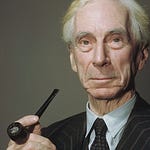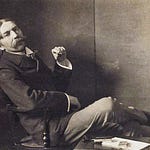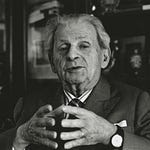Remember that band t-shirt you wore, emblazoned with a defiant slogan, or the edgy hairstyle you sported to subtly challenge the status quo? You felt like a rebel, didn’t you? You were speaking truth to power, asserting your individuality, standing apart from the drone. But what if that feeling, that very act of rebellion, was subtly, almost imperceptibly, being sold back to you? What if the system, far from being threatened by your dissent, was actually thriving on it, packaging it, and marketing it as the next big trend?
This isn’t some outlandish conspiracy theory. It’s the profound insight offered by philosopher Herbert Marcuse, a key figure in the Frankfurt School. Marcuse argued that modern industrial society possesses an uncanny ability to absorb and neutralize opposition, turning revolutionary fervor into just another consumer choice. He saw a society so integrated, so “one-dimensional,” that it could make even rebellion feel comfortable, familiar, and ultimately, ineffective.
The One-Dimensional Cage
Marcuse’s seminal work, “One-Dimensional Man,” painted a sobering picture of advanced industrial society. He wasn’t talking about totalitarian states with overt oppression. Instead, he highlighted a more insidious form of control: one where critical thought and genuine opposition are eroded from within.
In this “one-dimensional” world, the lines between advertising and art, information and propaganda, true needs and false desires, become blurred. Our technological progress, while offering unprecedented comfort and convenience, also becomes a tool for domination.
Think about it. We are provided with an endless array of goods and services, all promising satisfaction, individuality, and even liberation. But do they truly liberate us, or do they simply trap us in a cycle of consumption, distracting us from deeper societal issues?
The people recognize themselves in their commodities; they find their soul in their automobile, hi-fi set, split-level home, kitchen equipment.
— Herbert Marcuse
This isn’t just about material goods. It’s about our very consciousness. Marcuse argued that the system fosters a way of thinking that accepts its own logic as the only possible reality. It narrows our imaginative and critical capacities, making it difficult to even conceive of alternatives.
The Co-option of Dissent: Repressive Desublimation
One of Marcuse’s most striking observations was how the system manages to defuse potential revolution by assimilating its very signs and symbols. He called this phenomenon “repressive desublimation.”
What does that mean? Historically, societal norms often imposed certain restrictions, creating psychic energy that could be channeled into art, philosophy, or even revolutionary action. But in the one-dimensional society, those restrictions are seemingly lifted, but in a way that serves the system’s ends.
Consider the counter-culture movements of the 1960s. They sought radical change, challenging established norms through music, fashion, and lifestyle. Yet, how long did it take for torn jeans, long hair, and protest anthems to become marketable commodities? The system didn’t suppress them outright; it absorbed them.
Fashion: From rebellion to runway trend.
Music: Radical lyrics packaged for mass consumption.
Lifestyle: “Alternative” living becoming a premium consumer choice.
Every ‘no’ gets turned into a ‘yes, buy this.’ Every symbol of defiance becomes a logo on a product. The very act of expressing non-conformity is transformed into a new conformist choice. This is not about genuine freedom, but controlled liberalization, where even our desire to break free is monetized and contained.
Understanding this process requires a critical lens, one that can see beyond the surface freedom offered by consumer culture.
Beyond False Needs: Towards True Liberation
Marcuse distinguished between “false needs” and “true needs.” False needs are those superimposed upon individuals by societal interests, perpetuated through advertising and media. We are told we “need” the latest gadget, the trendiest clothes, the perfect vacation, not because they are essential for human flourishing, but because they drive the economic engine and integrate us further into the consumerist cycle.
True needs, on the other hand, are those that are genuinely necessary for human freedom, self-realization, and a life lived in accordance with one’s authentic potential. These might include meaningful work, creative expression, genuine human connection, and a healthy environment.
The tragedy, according to Marcuse, is that the satisfaction of false needs prevents the recognition and pursuit of true needs. We become so accustomed to the comforts and distractions provided by the system that the idea of a radically different way of life seems utopian or even undesirable.
The advanced industrial society is a one-dimensional society not because individuality has vanished, but because its expression in autonomous thought and action has been systematically suppressed and absorbed into the prevailing technocratic rationality.
— Herbert Marcuse
This isn’t to say we should live in deprivation. It’s an invitation to critically examine the source of our desires. Are they truly our own? Or are they echoes of a system designed to keep us compliant and consuming?
The Challenge of Authentic Resistance
If even rebellion is co-opted, what does authentic resistance look like in a one-dimensional society? Marcuse acknowledged the profound difficulty. Genuine liberation, he suggested, would require a fundamental break from the prevailing logic, an ability to think and imagine “outside the box” when the box itself defines all reality.
It’s about fostering critical consciousness, refusing to be integrated, and daring to cultivate a “Great Refusal” – a refusal of the comfortable unfreedom offered by the system. This refusal might manifest not in grand, easily marketable gestures, but in:
Critical Thought: Unmasking the ideological underpinnings of consumer culture and societal norms.
Aesthetic Dimension: Embracing art and imagination that transcends and challenges the existing reality.
New Sensibility: Cultivating a different way of experiencing the world, one not mediated by constant consumption.
The most insidious form of control isn’t outright oppression, but the subtle art of making you feel rebellious while playing perfectly into the system’s hands.
This is not an easy path. It demands constant vigilance, introspection, and a willingness to question the very fabric of our perceived reality. It means looking beyond the surface freedom and recognizing the deeper mechanisms of control.
Unlock deeper insights with a 10% discount on the annual plan.
Support thoughtful analysis and join a growing community of readers committed to understanding the world through philosophy and reason.
Conclusion
Herbert Marcuse’s insights remain startlingly relevant in our hyper-consumerist, digitally saturated world. The illusion of rebellion is stronger than ever, as algorithms curate our “dissent,” and every subculture is swiftly commodified. His work serves as a powerful reminder that true liberation isn’t about choosing from a pre-selected menu of “alternative” options, but about developing the critical capacity to imagine and strive for a world fundamentally different from the one offered.
So, the next time you feel a surge of defiant energy, pause. Ask yourself: Is this truly an act of rebellion, or is it just another carefully curated performance within the grand theater of the one-dimensional society? The answer might be unsettling, but recognizing the illusion is the first step towards authentic freedom.











